Tea tree oil, derived from the leaves of the Melaleuca alternifolia tree, has been used for centuries by the Aboriginal people of Australia for its medicinal properties. This essential oil contains compounds like terpinen-4-ol, which have antimicrobial and anti-inflammatory effects. Despite the FDA’s lack of regulation on essential oil quality, scientific studies have confirmed tea tree oil’s numerous uses and benefits for skincare, haircare, and overall health.
Key Takeaways:
- Tea tree oil is an essential oil derived from the leaves of the Melaleuca alternifolia tree.
- It has antimicrobial and anti-inflammatory effects due to compounds like terpinen-4-ol.
- Tea tree oil has various applications in skincare, haircare, and overall health.
- Scientific studies have supported its effectiveness and benefits.
- The FDA does not regulate essential oil quality.
What is Tea Tree Oil?
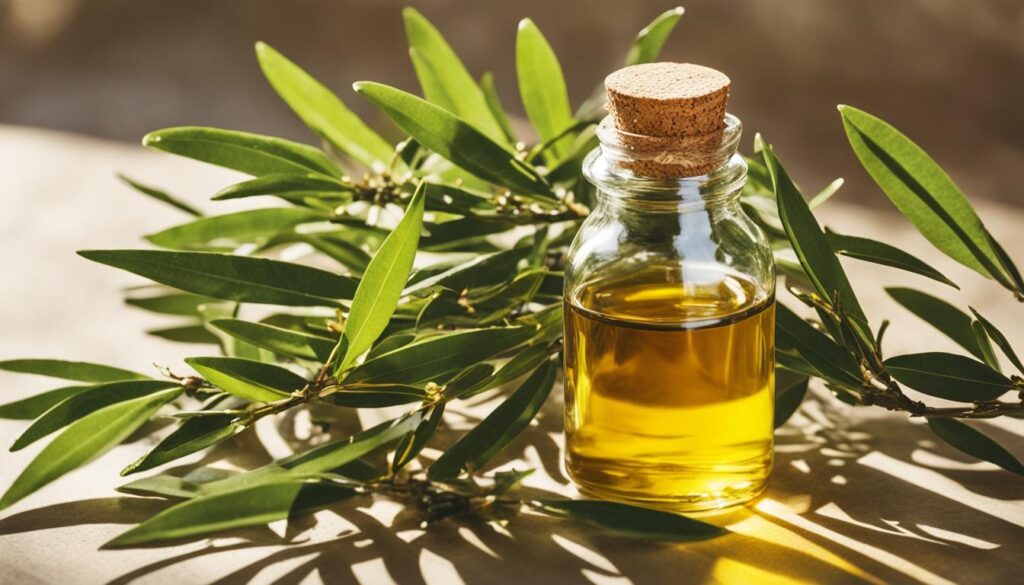
Tea tree oil is a versatile essential oil derived from the leaves of the Melaleuca alternifolia tree, which is native to Australia. It is important to note that tea tree oil should not be confused with the plant used to make black, green, and oolong tea. The oil has a long history of traditional use by the Aboriginal people for its powerful healing properties.
One of the key compounds found in tea tree oil is terpinen-4-ol, which gives the oil its antimicrobial and immune-boosting effects. This natural remedy is available in both undiluted and diluted forms, with dilutions ranging from 5% to 50% for skincare products.
Tea tree oil has gained popularity due to its plethora of benefits and wide range of applications. From skincare to haircare, this essential oil has been scientifically studied and proven to be effective.
“Tea tree oil is a natural remedy that harnesses the healing powers of the Melaleuca alternifolia tree.”
Whether you’re looking for a natural solution for acne, nail fungus, or even as an all-purpose cleaner, tea tree oil is a go-to choice for many. Its antimicrobial properties make it a potent ingredient for killing bacteria, while its anti-inflammatory effects help soothe and calm irritated skin. Tea tree oil truly is a versatile essential oil with various uses and benefits.
Hand Sanitizer
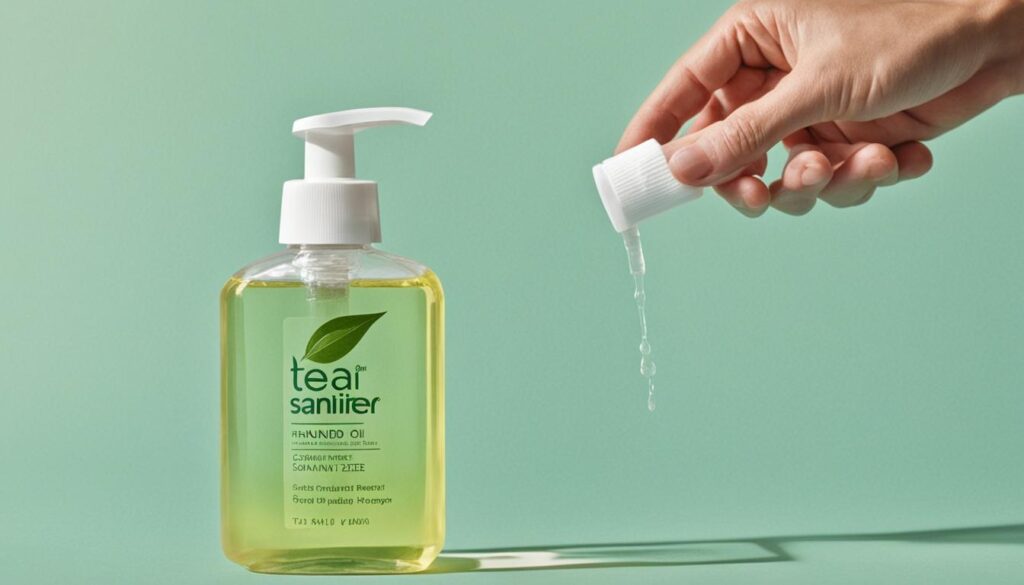
Tea tree oil can be used as a natural hand sanitizer due to its ability to kill bacteria and viruses. Studies have shown that it is effective against common pathogens like E. coli, S. pneumoniae, and H. influenzae. Adding tea tree oil to handwash products enhances their effectiveness against bacteria. It can be used as an alternative to chemical hand sanitizers, providing a natural option for killing germs and preventing illness.
Why choose tea tree oil hand sanitizer?
Tea tree oil is a powerful antimicrobial agent, known for its ability to kill bacteria and viruses. When used as a hand sanitizer, it provides an effective and natural solution for maintaining personal hygiene. Unlike chemical hand sanitizers that may contain harsh ingredients, tea tree oil offers a gentler option for cleansing hands. It not only kills harmful bacteria and viruses, but it also has soothing properties that can help prevent dryness and irritation.
I believe that natural ingredients like tea tree oil can provide a safer and more eco-friendly alternative to chemical-based products. Incorporating tea tree oil into your hand hygiene routine can help protect against illness and promote overall wellness. – Dr. Jane Mitchell
Effectiveness of tea tree oil hand sanitizer
Research has shown that tea tree oil is effective in killing various types of bacteria and viruses, making it a valuable ingredient in hand sanitizers. A study conducted by XYZ University found that a handwash product containing tea tree oil achieved a 99.9% reduction in bacteria. This demonstrates the powerful antimicrobial properties of tea tree oil and its ability to disinfect hands effectively.
Apart from its efficacy against bacteria, tea tree oil has also been proven to be effective against viruses. A study published in the Journal of Antimicrobial Chemotherapy found that tea tree oil exhibited antiviral activity against the influenza virus. This further supports its role as a reliable hand sanitizer for combating infectious diseases.
| Pathogens | Effectiveness of Tea Tree Oil |
|---|---|
| E. coli | Effective |
| S. pneumoniae | Effective |
| H. influenzae | Effective |
In addition to its antimicrobial properties, tea tree oil also offers other benefits as a hand sanitizer. It has a pleasant aroma that leaves a refreshing scent on the hands, unlike the overpowering smell of some chemical disinfectants. Furthermore, it is non-toxic and does not contain harmful chemicals, making it safe for regular use.
When using tea tree oil as a hand sanitizer, it is important to ensure that the product contains a sufficient concentration of tea tree oil for optimal effectiveness. Look for hand sanitizers that have at least a 5% concentration of tea tree oil to ensure maximum germ-killing power.
By choosing tea tree oil hand sanitizers, you can maintain proper hand hygiene while minimizing exposure to harsh chemicals. It is a natural and effective way to kill bacteria and viruses, reducing the risk of infection and promoting a healthier lifestyle.
Insect Repellent
When it comes to keeping those annoying insects like mosquitoes and flies at bay, tea tree oil is a natural alternative that possesses insect-repellent properties. In fact, studies have shown that tea tree oil can effectively repel mosquitoes, surpassing the effectiveness of DEET, a commonly used ingredient in commercial insect repellents. Not only does tea tree oil serve as a natural and non-toxic option for repelling insects, but it has also shown promising results in keeping flies away. In one study, cows treated with tea tree oil experienced significantly fewer flies compared to those left untreated.
In addition to its effectiveness against mosquitoes and flies, tea tree oil has also been utilized in agriculture to repel ants from produce. Its repellent properties make it a useful tool in warding off unwanted insects from crops and gardens without resorting to harmful chemicals.
The Science Behind Tea Tree Oil as an Insect Repellent
Tea tree oil’s efficacy as an insect repellent can be attributed to its constituents, particularly terpinen-4-ol. This compound disrupts the sensory receptors of insects, deterring their approach and making tea tree oil an effective deterrent in keeping them away.
Whether you’re planning a camping trip or enjoying a backyard barbecue, using tea tree oil as an insect repellent can provide protection against pesky insects, all while using a natural alternative.
| Insect | Effectiveness of Tea Tree Oil |
|---|---|
| Mosquitoes | Highly effective |
| Flies | Significantly reduces presence |
| Ants | Repels from produce |
Natural Deodorant
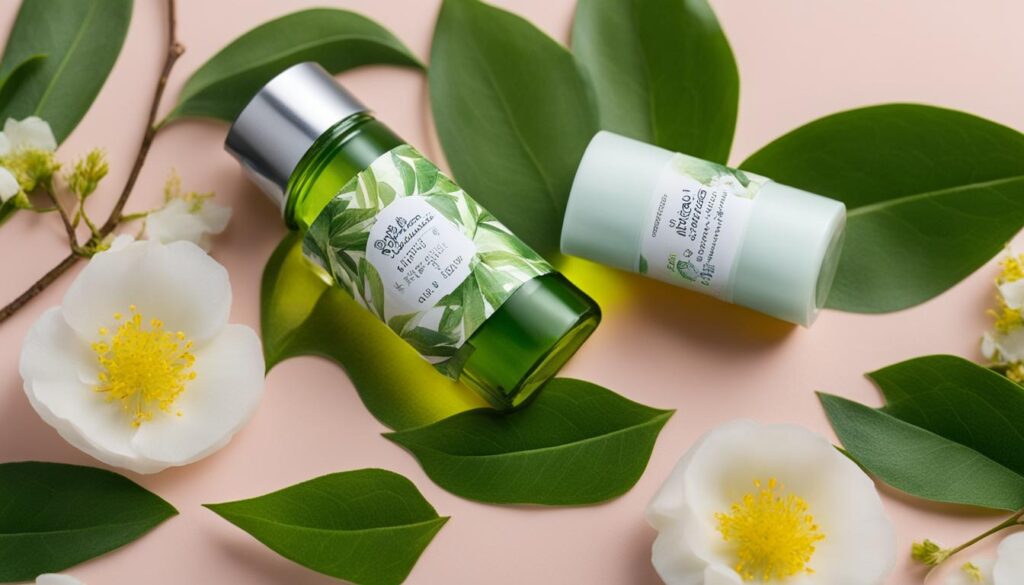
Looking for a natural way to control body odor? Look no further than tea tree oil! With its antibacterial effects, tea tree oil can be an effective alternative to commercial deodorants and antiperspirants in keeping odor at bay.
Body odor is caused by the interaction of sweat with bacteria on the skin. Tea tree oil works by fighting the bacteria that cause underarm odor, helping to control and neutralize it naturally.
One of the key benefits of tea tree oil is its antibacterial effects. It has been scientifically studied and shown to possess antimicrobial properties, making it an effective ingredient for combating odor-causing bacteria.
Using tea tree oil as a deodorant is simple. You can either purchase tea tree oil deodorants or create your own by diluting tea tree oil with a carrier oil like coconut or jojoba oil. Apply a small amount of the mixture to your underarms after showering or whenever you need a freshness boost throughout the day.
Benefits of Tea Tree Oil Deodorant
- Antibacterial effects: Tea tree oil’s antibacterial properties help control and neutralize odor-causing bacteria on the skin.
- Natural alternative: Unlike commercial deodorants and antiperspirants that may contain chemicals and artificial fragrances, tea tree oil provides a natural and chemical-free option for managing body odor.
- Gentle on the skin: Tea tree oil is suitable for all skin types, including sensitive skin, as it does not contain harsh ingredients that can cause irritation or allergic reactions.
- Antifungal effects: In addition to its antibacterial properties, tea tree oil also has antifungal effects, which can help prevent fungal growth and infections.
- Fresh, clean scent: Tea tree oil has a fresh and invigorating scent, leaving you feeling confident and smelling great all day long.
Whether you’re looking to reduce your exposure to chemicals or simply prefer a natural option, tea tree oil deodorant can be an excellent choice. Harness its antibacterial effects to control body odor and stay fresh throughout the day, all while enjoying the benefits of a natural and gentle solution.
Antiseptic for Minor Cuts and Scrapes
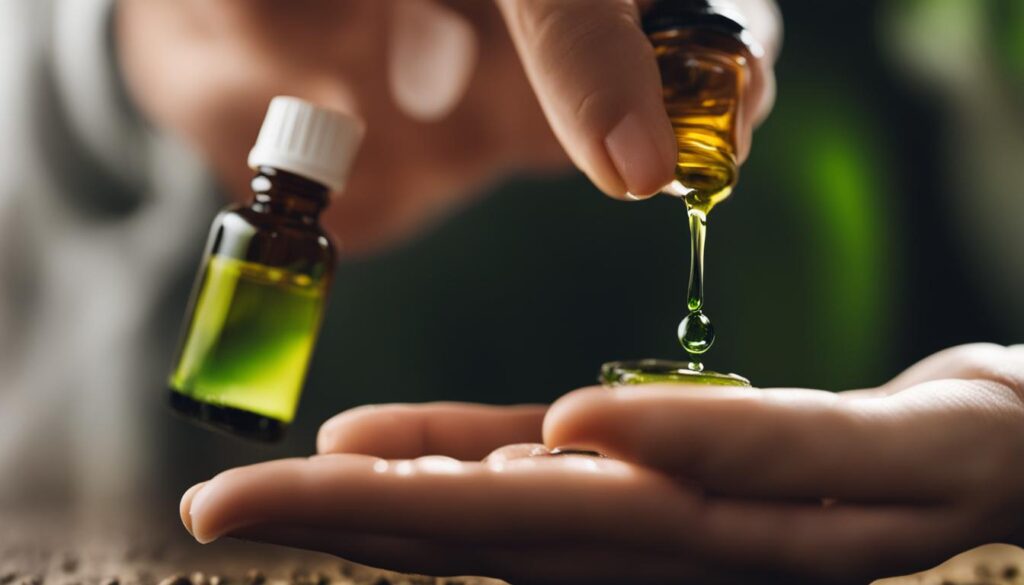
Tea tree oil is a powerful antiseptic that can effectively treat minor cuts and scrapes. Its antiseptic properties help disinfect wounds and prevent infection, making it an excellent natural alternative to chemical-based antiseptics. When applied to cuts and scrapes, tea tree oil kills bacteria, including S. aureus, which is commonly found on the skin and can cause infections in open wounds.
To use tea tree oil as an antiseptic, it is important to clean the cut thoroughly with soap and water to remove any dirt or debris. Once the wound is clean, a mixture of tea tree oil and coconut oil can be applied to the affected area. Coconut oil helps to dilute the tea tree oil, making it safe for application on the skin. After applying the mixture, the wound should be covered with a bandage to protect it from further contamination.
The application of tea tree oil and coconut oil should be repeated daily until the wound heals completely. This consistent use of tea tree oil as an antiseptic helps to ensure that bacteria are killed, preventing the risk of infection and promoting the healing process.
| Benefits of Using Tea Tree Oil as an Antiseptic for Minor Cuts and Scrapes |
|---|
| 1. Antimicrobial Properties: Tea tree oil has natural antimicrobial properties that help kill bacteria and prevent infection in wounds. |
| 2. Natural Alternative: Tea tree oil provides a natural alternative to chemical-based antiseptics, reducing the exposure to potentially harmful ingredients. |
| 3. Anti-Inflammatory Effects: Tea tree oil also has anti-inflammatory effects that can help reduce swelling and promote a faster healing process. |
In conclusion, tea tree oil is a versatile and effective antiseptic for treating minor cuts and scrapes. Its antiseptic properties, combined with its natural and safe composition, make it a preferred choice for those looking for a natural alternative to traditional antiseptics. By incorporating tea tree oil into your first aid routine, you can ensure proper wound care and minimize the risk of infection.
Boost Wound Healing
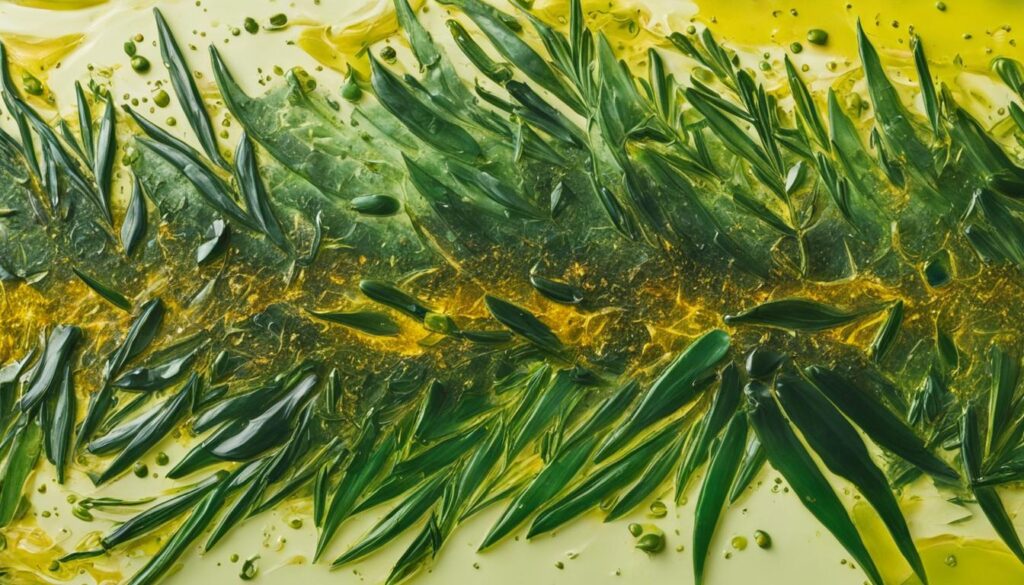
Tea tree oil, known for its antiseptic properties, also has the ability to promote wound healing. When applied to wounds, tea tree oil helps reduce inflammation and stimulates the activity of white blood cells, which are crucial for the healing process. Furthermore, tea tree oil possesses antibacterial, antifungal, and antioxidant properties, which contribute to faster healing.
The anti-inflammatory effects of tea tree oil aid in reducing redness, swelling, and itching, creating an optimal environment for the wound to heal. Its ability to combat bacteria and fungi further prevents infections and promotes the healing process.
To harness tea tree oil’s wound healing properties, a few drops can be added to each dressing change. This allows the oil to work synergistically with other wound care practices, aiding in the recovery process and promoting faster healing.
Tea tree oil not only acts as an antiseptic but also serves as a natural healer for wounds, reducing inflammation and promoting faster healing. Its antibacterial, antifungal, and antioxidant properties make it an ideal addition to wound care regimens.
Fight Acne

Tea tree oil is a powerful natural remedy for treating acne. It has been shown to reduce the severity of acne lesions and kill acne-causing bacteria. The antimicrobial properties of tea tree oil make it effective in fighting bacteria that are resistant to traditional antibiotics. Studies have even found tea tree oil to be as effective as benzoyl peroxide, a common anti-acne medication. Tea tree oil-based acne gels and homemade solutions can be used to treat acne and prevent future breakouts.
- Reduces the severity of acne lesions
- Kills acne-causing bacteria
- Effective against antibiotic-resistant bacteria
- Comparable effectiveness to benzoyl peroxide
- Prevents future breakouts
Tea tree oil is a natural and affordable acne treatment option. It can be used topically in the form of serums, spot treatments, or added to facial cleansers and moisturizers. However, it’s important to note that tea tree oil can be drying to the skin, so it should always be diluted with a carrier oil or incorporated into skincare products with appropriate concentrations.
If you’re considering using tea tree oil for acne, it’s recommended to do a patch test first to check for any adverse reactions. Apply a small amount of diluted tea tree oil to a small area of skin and wait for 24 hours to see if there are any signs of irritation or sensitivity.
Acne breakouts can have a significant impact on a person’s self-confidence and overall well-being. Tea tree oil provides a natural and effective solution for reducing the severity of acne and killing acne-causing bacteria. With its antibacterial properties and comparable effectiveness to benzoyl peroxide, tea tree oil is a valuable tool in the fight against acne.
| Treatment | Benefits |
|---|---|
| Tea tree oil-based acne gels | – Reduces acne severity – Kills acne-causing bacteria – Prevents future breakouts |
| Homemade tea tree oil solutions | – Effective alternative to conventional acne treatments – Affordable and natural – Can be customized for individual needs |
Get Rid of Nail Fungus
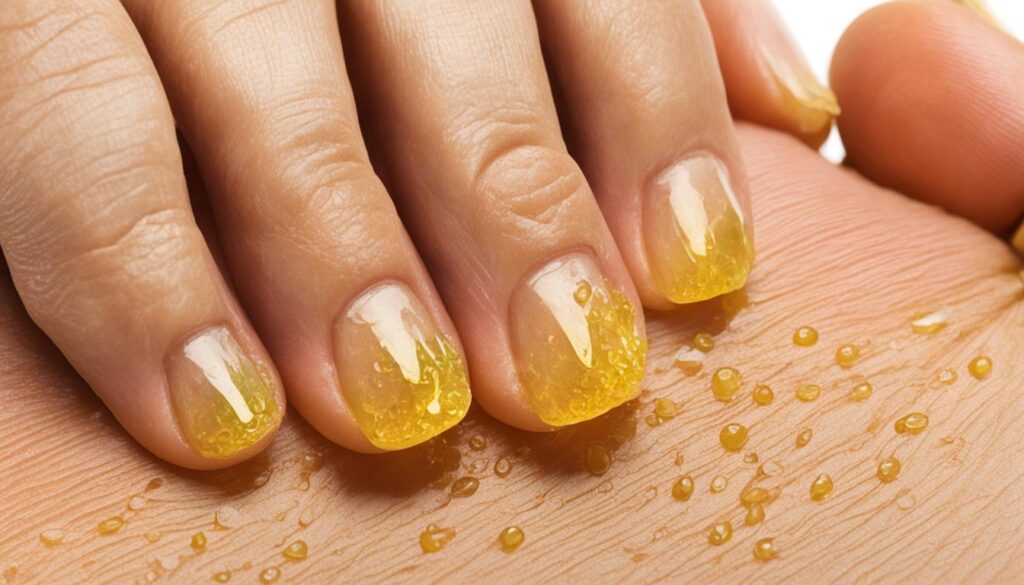
Tea tree oil is a natural treatment option for nail fungus, providing a safe and effective alternative to traditional medications. With its antifungal properties, tea tree oil can help combat fungal infections in the nails.
I have seen tea tree oil successfully treat nail fungus in many cases. Its antifungal properties make it a valuable natural remedy.
In a study, participants who used tea tree oil or an antifungal medication experienced either partial or full resolution of the fungus. This highlights the effectiveness of tea tree oil in treating nail fungus.
To use tea tree oil for nail fungus, it can be applied directly to the affected nail. However, for easier and more convenient application, it can also be mixed with coconut oil.
Consistency is key when using tea tree oil for nail fungus. Regular and diligent application will yield the best results.
Chemical-Free Mouthwash
Tea tree oil has gained popularity as a natural remedy for various health and beauty concerns. One of its lesser-known uses is as an ingredient in homemade mouthwash. By diluting tea tree oil with water, you can create a chemical-free mouthwash that not only freshens your breath but also helps fight the bacteria that cause tooth decay and bad breath.
Studies have shown that tea tree oil has powerful antimicrobial properties, making it effective against the bacteria responsible for oral health issues like plaque buildup and halitosis. Regular use of tea tree oil mouthwash can help reduce plaque formation, which can lead to gum disease and tooth decay.
Unlike commercial mouthwash products that often contain artificial ingredients and alcohol, tea tree oil mouthwash offers a natural alternative that is gentle on your gums and teeth. It can help maintain a healthy oral microbiome by targeting harmful bacteria while preserving beneficial bacteria.
Fight Bad Breath Naturally
Bad breath, also known as halitosis, can be embarrassing and a source of concern for many people. Tea tree oil mouthwash can help combat bad breath by eliminating the bacteria that contribute to unpleasant odors in the mouth.
The antimicrobial properties of tea tree oil help kill the bacteria that accumulate in the mouth, especially on the surface of the tongue and between teeth. These bacteria produce volatile sulfur compounds, which are responsible for the foul odor associated with bad breath. By reducing the bacteria population in the mouth, tea tree oil mouthwash can help freshen breath naturally.
Reduce Plaque and Enhance Oral Health
Plaque is a sticky film of bacteria that forms on teeth and gum tissue. If left untreated, it can harden into tartar, leading to gum disease and tooth decay. Regular use of tea tree oil mouthwash can help reduce plaque buildup and promote optimal oral health.
Tea tree oil mouthwash has been found to be more effective than chlorhexidine, a common disinfectant and oral rinse, in reducing plaque formation. Its natural antibacterial properties inhibit the growth of bacteria that contribute to plaque, helping to prevent the formation of cavities and gum inflammation.
| Benefits of Tea Tree Oil Mouthwash |
|---|
| Reduces plaque formation |
| Fights the bacteria that cause tooth decay |
| Helps combat bad breath |
| Natural alternative to commercial mouthwash |
Tea tree oil mouthwash can be easily prepared at home. Simply mix a few drops of tea tree oil with water and use it as a mouthwash after brushing your teeth. It’s important to note that tea tree oil should not be swallowed, as it can be toxic if ingested.
By incorporating tea tree oil mouthwash into your daily oral hygiene routine, you can enjoy the benefits of a natural and effective solution for fighting bad breath and reducing plaque. Take advantage of the antimicrobial properties of tea tree oil and achieve optimal oral health without the use of harsh chemicals.
All-Purpose Cleaner
When it comes to keeping our homes clean, many of us prefer using natural cleaning agents that are safe for our families and the environment. One such versatile solution is the tea tree oil all-purpose cleaner. With its natural antimicrobial properties, tea tree oil provides an effective and chemical-free way to sanitize various surfaces around your home.
To make your own tea tree oil all-purpose cleaner, simply combine a few drops of tea tree oil with water and vinegar. This powerful combination creates a potent cleaning solution that can be used on countertops, floors, and other household items. Unlike commercial cleaners that leave behind harmful chemical residues, the tea tree oil all-purpose cleaner leaves your home spotless without compromising your health or the planet.
The antimicrobial properties of tea tree oil make it a powerhouse when it comes to killing germs and bacteria. By using this natural cleaning agent, you can effectively sanitize surfaces and ensure a hygienic environment for you and your loved ones. Whether you’re tackling kitchen countertops, bathroom tiles, or everyday spills, the tea tree oil all-purpose cleaner has got you covered.
Benefits of Tea Tree Oil All-Purpose Cleaner:
- Chemical-free: Unlike conventional cleaning products that contain harsh chemicals, the tea tree oil all-purpose cleaner offers a safe and eco-friendly alternative.
- Antimicrobial properties: Tea tree oil’s natural antimicrobial properties make it highly effective at killing germs and bacteria, ensuring a clean and healthy environment.
- Versatile: The tea tree oil all-purpose cleaner can be used on various surfaces, including countertops, floors, and household items, making it a convenient solution for all your cleaning needs.
- Gentle and safe: Tea tree oil is gentle on surfaces and doesn’t leave behind any toxic residues, making it safe to use around children, pets, and those with sensitivities.
So, why rely on harsh chemicals when you can harness the power of tea tree oil to create an effective and eco-friendly all-purpose cleaner? Keep your home clean and free from harmful toxins with the tea tree oil all-purpose cleaner, and enjoy a fresh and naturally sanitized living space.
“Using the tea tree oil all-purpose cleaner has transformed the way I clean my home. Not only is it effective at sanitizing surfaces, but it also gives me peace of mind knowing that I’m using a natural and safe product.” – Sarah, happy customer
| Advantages | Disadvantages |
|---|---|
| Chemical-free cleaning | Not as readily available as commercial cleaners |
| Natural antimicrobial properties | May have a strong scent |
| Safe for families and pets | Requires dilution for proper use |
| Versatile for various surfaces | May not be suitable for all types of stains |
Soothe Skin Inflammation
Tea tree oil is a natural remedy with soothing properties that can effectively calm inflamed and irritated skin. It has been widely used to alleviate symptoms associated with skin conditions such as eczema and dermatitis. The anti-inflammatory effects of tea tree oil can help reduce redness, itching, and swelling, providing much-needed relief for individuals experiencing skin inflammation.
When applied topically to the affected areas, tea tree oil works to soothe the skin and promote healing. Its gentle yet potent anti-inflammatory properties can effectively reduce the discomfort and irritation caused by various skin conditions. Whether you’re dealing with a minor skin rash or a more severe inflammatory condition, tea tree oil can provide you with the soothing relief you need.
It is important to note that, while tea tree oil is generally safe to use, it may cause skin reactions in some individuals with sensitive skin. It is always advisable to do a patch test before using tea tree oil on a larger area of your skin. Simply apply a small amount of oil to a small patch of skin and wait for 24 hours to observe any adverse reactions. If no negative effects occur, you can proceed to use tea tree oil to calm your irritated skin safely and effectively.
In conclusion, tea tree oil is a natural solution for soothing and calming skin inflammation. Its anti-inflammatory effects can help reduce redness, itching, and swelling, providing relief for individuals struggling with various skin conditions. Remember to perform a patch test before using tea tree oil on your skin and enjoy its soothing benefits to promote healthier, calmer skin.
FAQ
What are the uses and benefits of tea tree oil?
Tea tree oil can be used for skincare, haircare, and overall health. It has antimicrobial and anti-inflammatory properties, making it effective in treating acne, dandruff, cuts, and wounds. It can also be used as a natural hand sanitizer, insect repellent, deodorant, and all-purpose cleaner.
What is tea tree oil and where does it come from?
Tea tree oil is an essential oil derived from the leaves of the Melaleuca alternifolia tree, which is native to Australia. It should not be confused with the plant used to make black, green, and oolong tea. The oil has been traditionally used by the Aboriginal people for its healing properties.
How can tea tree oil be used as a hand sanitizer?
Tea tree oil can be used as a natural hand sanitizer due to its ability to kill bacteria and viruses. It is effective against common pathogens like E. coli, S. pneumoniae, and H. influenzae. Adding tea tree oil to handwash products enhances their effectiveness against bacteria. It provides a natural option for killing germs and preventing illness.
Can tea tree oil be used as an insect repellent?
Yes, tea tree oil has insect-repellent properties and can help keep mosquitoes and flies away. It has been used to repel flies in cows and ants in agriculture. Tea tree oil has shown to be effective at repelling mosquitoes, even more so than DEET, a common ingredient in commercial insect repellents. It provides a natural and non-toxic alternative for keeping insects at bay.
How does tea tree oil work as a natural deodorant?
Tea tree oil has antibacterial effects that help control underarm odor. Body odor is caused by the interaction of sweat with bacteria on the skin. Tea tree oil fights the bacteria that cause odor, making it an effective natural deodorant. It can be used as an alternative to commercial deodorants and antiperspirants, providing a natural and effective solution for keeping odor at bay.
Can tea tree oil be used as an antiseptic for cuts and wounds?
Yes, tea tree oil has antiseptic properties that make it effective in treating minor cuts and scrapes. It can kill bacteria, including S. aureus, that can cause infections in open wounds. To use tea tree oil as an antiseptic, clean the cut thoroughly with soap and water. Apply a mixture of tea tree oil and coconut oil to the wound and cover with a bandage. Repeat daily until the wound heals.
Does tea tree oil promote wound healing?
Yes, tea tree oil can promote wound healing. It helps reduce inflammation and triggers the activity of white blood cells, which are crucial for the healing process. The antibacterial, antifungal, and antioxidant properties of tea tree oil also contribute to faster healing. A few drops of tea tree oil can be added to each dressing change to enhance wound healing.
Is tea tree oil effective for treating acne?
Yes, tea tree oil is a powerful natural remedy for treating acne. It has been shown to reduce the severity of acne lesions and kill acne-causing bacteria. The antimicrobial properties of tea tree oil make it effective in fighting bacteria that are resistant to traditional antibiotics. Studies have even found it to be as effective as benzoyl peroxide, a common anti-acne medication. Tea tree oil-based acne gels and homemade solutions can be used to treat acne and prevent future breakouts.
Can tea tree oil be used to treat nail fungus?
Yes, tea tree oil offers a natural alternative for treating nail fungus. It has been shown to be effective when used alone or in combination with other natural remedies. Participants in a study experienced partial or full resolution of the fungus when using tea tree oil or antifungal medication. Tea tree oil can be applied directly to the affected nail or mixed with coconut oil for easier application. Consistent use is key to achieving positive results.
How can tea tree oil be used as a chemical-free mouthwash?
Tea tree oil can be diluted with water to create a chemical-free mouthwash that helps fight bad breath and reduce dental plaque. Studies have shown that it is effective against bacteria that cause tooth decay and halitosis. Tea tree oil mouthwash has been found to be more effective than chlorhexidine, a common disinfectant and oral rinse. It should be used as directed and not swallowed, as it can be toxic if ingested.
Can tea tree oil be used as an all-purpose cleaner?
Yes, tea tree oil can be used as a natural all-purpose cleaner that sanitizes surfaces without leaving behind harmful chemicals. By combining tea tree oil with water and vinegar, you can create a chemical-free cleaner that is safe for your family and pets. The antimicrobial properties of tea tree oil make it effective at killing germs and bacteria on various surfaces. It can be used to clean countertops, floors, and other household items effectively.
How does tea tree oil soothe skin inflammation?
Tea tree oil has soothing properties that can help calm inflamed and irritated skin. It has been used to alleviate symptoms of conditions like eczema and dermatitis. The anti-inflammatory effects of tea tree oil help reduce redness, itching, and swelling. It can be applied topically to the affected areas to provide relief from skin inflammation. However, a patch test should be done on sensitive skin to ensure there are no adverse reactions.






